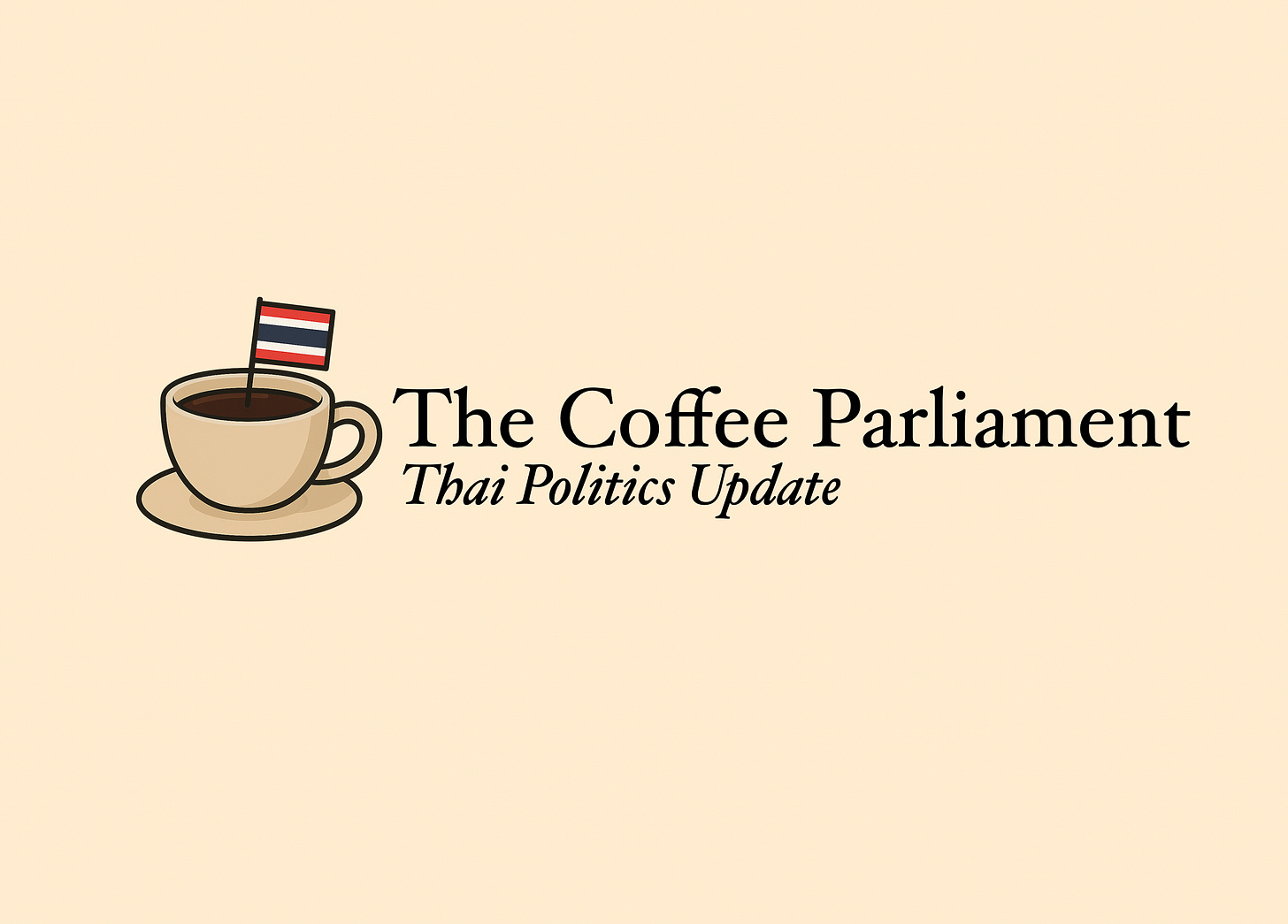The Walls Are Closing In
The Shinawatras await three rulings from the courts
Over the next month, we will be getting the results of several important court changes that will determine the future of the Pheu Thai government. I wanted to take some time today to analyze these cases.
The first decision we will receive is likely to be the case on Prime Minister Paetongtarn Shinawatra’s leaked voice call with Hun Sen. She has now submitted her written explanation to the Constitutional Court, after receiving multiple extensions. I would expect that we get a ruling sometime before the end of August. The government has denied rumors that Paetongtarn plans to resign before a ruling is handed down, arguing that they are confident, but the general sentiment seems to be that Paetongtarn will be removed from office.
We have two clues in this regard. Firstly, the court decision to suspend Paetongtarn temporarily was a lopsided affair — 7 to 2 in favor. (The two judges who voted not to suspend her still argued that her ability to discharge duties related to national security, foreign affairs, and the treasury should be paused until a ruling is handed down). The court also voted again on whether to grant Paetongtarn her final extension. This was a closer affair, with 5 to 4 in favor. As The Manager wrote: “This was a very close vote…many people have observed that this is not a complex case and the court can already make a decision. Such a close vote reflects the likely result.”
While the removal of a prime minister is obviously very important, ultimately the two cases facing her father, former prime minister Thaksin Shinawatra, may be even more critical to Thailand’s political landscape. On August 22nd, the Criminal Court will rule on whether Thaksin committed lese-majeste in an interview he gave in 2015 to a South Korean newspaper. We also have the legal case on Thaksin Shinawatra’s stay at the Police General Hospital; the Supreme Court has scheduled the ruling for September 9th, after questioning almost thirty witnesses including corrections officials and doctors. (While reports have emerged of what these witnesses said during these hearings, technically the Supreme Court has ordered that the contents of the hearings not be disseminated, in part due to privacy concerns about personal health information.)
In one interesting observation, Thai Pakdee Party leader (and longtime foe of Thaksin, so admittedly not an impartial source) Warong Dechgitvigrom pointed out on July 18 that Thaksin chose to reduce the number of witnesses he would present in the lese-majeste case from fourteen to three, which could accelerate the court ruling. Warong suggested speeding this ruling might be beneficial to Thaksin. This is because, he argued, Thaksin’s defense team may feel reasonably confident about winning the lese-majeste case, which would then allow him to travel freely. (He currently cannot travel internationally without requesting permission from the court due to the lese-majeste case). Warong finally speculated that before the ruling on the hospitalization case is handed down, “a certain person” may “fly abroad on business…possibly without returning to Thailand.” (Months ago, Thaksin denied speculation that he was planning to flee).
As I have noted in previous pieces, a negative ruling against Thaksin in either case — which could send him back to prison — could potentially prove to be a “game changer” in Thai politics. Paetongtarn being removed is significant, but Pheu Thai still has one last PM candidate in Chaikasem Nitisiri. Yet the prospect of Thaksin being imprisoned (in actual jail, not a hospital) is something I find difficult for the Shinawatras to accept. But with their popularity having evaporated over the past few weeks, the most important weapon in their arsenal — electoral strength — is also gone. What happens if they feel cornered? Should the court rulings prove detrimental, we will soon find out.



I can't see Thaksin ever accepting jail. He will surely flee if there's any inkling the case will go against him.
The Shinawatra family's world seems to be collapsing around both themselves and their Pheu Thai party. Electorally, the People's Party and Bhumjaithai will be the most likely to benefit if an election were to be called. But meanwhile, effective governance goes from bad to worse, and the military's position has strengthened significantly given strong support from most Thais for their response to the Cambodian border clashes and the lack of civilian government leadership in this regard. Unless the current government ups its act in the coming months, I suspect another coup could well be on the cards -- and even be welcomed by a large proportion of the population. Any thoughts?